The Communications Ministry is expected to hold a hearing on cellphone companies in the coming weeks to decide whether to abolish the system whereby haredi (ultra-Orthodox) customers with a “kosher” cellphone number are unable to connect their number to a cellular service without rabbinic oversight.
This hearing is part of a broader process being taken by Communications Minister Yoaz Hendel to reform what has been described as the monopoly of a rabbinic committee over the haredi kosher cellphone market.
This monopoly has given the Rabbinic Committee for Communications, as it is called, strong leverage over the kosher cellphone business, as well as powerful tools that have societal and commercial effects.
Kosher phones used by the haredi public are designed to prevent their users from accessing the Internet, and, originally, phone services with sexual content.
Approved devices are all “dumb-phones,” meaning they have no Internet access and can only make and receive calls, have no camera, and cannot even receive SMS messages.

The phone numbers themselves are also distinct, and have specific digits after the company’s prefix, so that if someone calls from a service not approved by the rabbinic committee, it will be immediately apparent that the caller does not have a supervised phone number and device.
Although cellphone users in the general population have been able to connect their phone to different providers over the last decade due to reforms to the market, the ability for someone with a kosher phone to switch to a service not authorized by the rabbinic committee has until now not been possible.
They are however able to move their number to a kosher service from a different provider.
Since the rabbinic committee has the power to block phone numbers from its customers, this has given it powerful sway over the haredi community.
Aside from blocking phone lines with sexual services, commercial businesses of different types have also been blocked, while phone lines for various welfare services, including centers for victims of sexual abuse, and even health HMO call centers have been blocked.
In addition, a kosher phone number is used within the haredi community as a kind of “haredi identity pass,” so that, for example, acceptance for an individual’s children to schools in the sector can be dependent on the use of a kosher phone.
Allowing people to switch their current numbers with the rabbinic committee’s supervised prefixes to a non-supervised cellphone service would compromise the ability of institutions in the haredi sector to maintain this kind of oversight over community members.
The minister recently received a legal opinion from the state Competition Authority on the inability of customers to connect their number to another unsupervised provider, which stated that this level of control and monopoly should indeed be broken up.
One of the goals of this reform would also allow different rabbinic committees to be established, allowing people to choose different standards of supervision, and weakening the ability of the Rabbinic Committee for Communications to assert its own commercial interests and political interests.
In July, Hendel passed reforms that banned the committee from blocking welfare services and state institutions, including HMO call centers.
In addition, the new regulations determined that the cellphone companies must document any request by the committee to block a number, and record the stated reason for the request, while also publishing on their websites a list of blocked numbers and their associated institution or business.
“Those who have suffered the most from the way kosher phone lines are run are the haredi public, which pays more, receives less, and is exposed to arbitrary blocks,” Hendel has said. “Transparency will end the use of extraneous considerations, which have been part of the mechanism of blocking numbers until now.”
